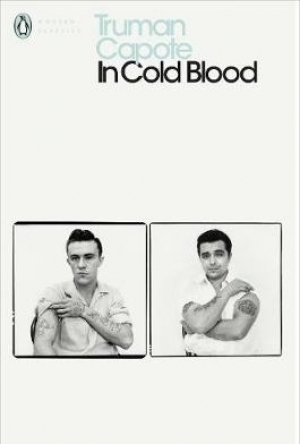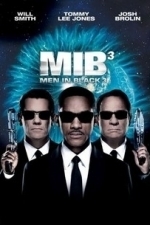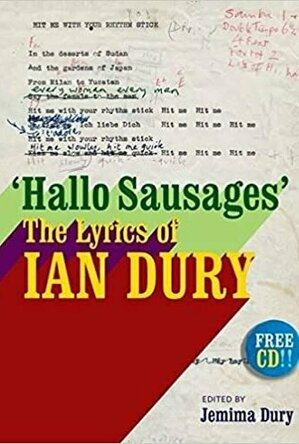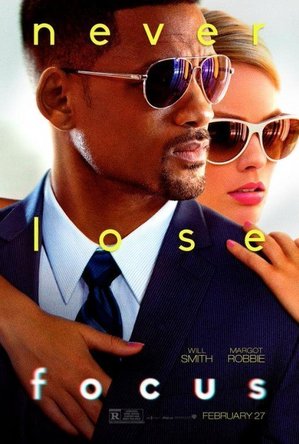Hadley (567 KP) rated In Cold Blood: A True Account of a Multiple Murder and Its Consequences in Books
Aug 2, 2020
The novel, which was published in 1965, is an eyewitness account of Capote's visitation to the scene of the murder as well as meetings with the murderers and townspeople- - - a retelling of the crime and aftermath, mostly from the eyes of those affected, by hundreds of hours of interviews and interrogations. The novel, ultimately, was the end of Capote which led him to alcoholism that took his life in 1984.
Like most small-town murders, a tension between residences is created when a well-known and well-liked family of four is brutally murdered, and everyone begins to point a finger at the other: "But afterward the townspeople, theretofore sufficiently unfearful of each other to seldom trouble to lock their doors, found fantasy re-creating them over and again - - - those somber explosions that stimulated fires of mistrust in the glare of which many old neighbors viewed each other strangely, and as strangers." Fortunately, the KBI (Kansas Bureau of Investigation) didn't allow these accusations to keep them from finding the real killers.
" 'Deep down,' Perry continued, 'way, way rock bottom, I never thought I could do it. A thing like that.' " Perry Smith, one of the murderers, confesses to his cohort and partner-in-crime, Richard Hickock, about murdering the Clutter family. "Presently, he said, 'Know what it is that really bugs me? About that other thing[Clutter murder]? It's just I don't believe it- - - that anyone can get away with a thing like that.' And he suspected that Dick [Richard] didn't, either. For Dick was at least partly inhabited by Perry's mystical-moral apprehensions. Thus: 'Now, just shut up!' "
Capote writes clearly of the impact that Smith's and Hickock's past may have played leading up to the murders, mostly focusing on Smith's traumatic childhood. During the trial portion of the book, a psychologist is brought in to point out how the two murderers may not have been responsible for their actions due-to instances in their past - - - a horrific car crash in Hickock's that left him with a lop-sided face and black-out spells, as well as Smith being physically and emotional abused by his alcoholic mother and father. In exploring these traumas, In Cold Blood leaves the impression that these two men were merely ticking time bombs and that the Clutter family, unfortunately, had to pay for it.
The trauma shared by Hickock and Smith help to shape the two murderers into actual human beings rather than monsters throughout the novel: one scene, where we get to read a letter to Smith from his last living sister, readers get to see how he was perceived by his family members, as his sister goes on to degrade him to the maturity level of a child and that she is above him because of that- - -but she also reveals her jealousy of their father loving him more than he ever loved her (despite the excessive abuse). A close friend of Smith's tells him to be careful writing her anymore because he believes that: 'they can only serve to increase your already dangerous anti-social instincts.'
Part of the narrative, too, is the KBI agent in-charge of the Clutter murder, Alvin Dewey: One day while visiting Holcomb's well-known cafe (Hartman's) where Dewey is told he looks awful from weight loss and fatigue - - - Dewey recalls that he had spent: 'two wearying and wasted days trying to trace that phantom pair, the Mexicans sworn by Paul Helm to have visited Mr. Clutter on the eve of the murders.' And then he gets heckled by a local, who wants to know why he hasn't found the people responsible yet,but Dewey simply smiles and walks away, having put up with numerous people being angry that the murders were taking so long to solve.
But it wasn't footwork that got the pair arrested, it was an old cellmate who had given Hickock the idea that there was $10,000 in a safe at the Clutter farm that came forward: (read this on my blog because I had to cut it out since my review was too long!).
Meanwhile, readers also get to experience Hickock and Smith's troubles as they are on the run after the murders which is done masterfully by Capote. And although one would assume that the killers would stay as far away from Kansas as possible, the two end up back there, only to miraculously get out before the police can catch up with them. The pair decide to head to Florida, where, on December 19, 1959, an entire family was murdered in the exact same way as the Clutters; Hickock and Smith both adamantly denied that they were involved with it - - - and back in 2012- - - Hickock and Smith's bodies were exhumed to compare their DNA with a profile found on one of the victim's clothing: they were not a match. The case remains unsolved til this day.
" Presently he[Smith] came across an inner-page story that won his entire attention. It concerned murder, the slaying of a Florida family, a Mr. and Mrs. Clifford Walker, their four-year-old son, and their two-year-old daughter. Each of the victims, though not bound or gagged, had been shot through the head with a .22 weapon. The crime, clueless and apparently motiveless, had taken place Saturday night, December 19, at the Walker home, on a cattle-raising ranch not far from Tallahassee."
Not soon after the pair leave the Florida beaches, they are arrested on what they believe to be parole violations, but it's clear, when the arresting officers are KBI agents that they had been caught for the Clutter murders. " 'Listen good, Perry. Because Mr. Duntz[KBI agent] is going to tell you where you really were...' Midway in the questioning, after he'd[Smith] begun to notice the number of allusions to a particular November weekend, he'd nerved himself for what he knew was coming, yet when it did, when the big cowboy with the sleepy voice said, 'You were killing the Clutter family' - - - well, he'd damn near died. That's all. "
The confession that follows is the most intense part of the book, given in it's entirety, readers finally get to know what happened to the Clutter family that cold night in November, 1959. Smith reveals that he never had the intention to kill anyone in the home, and that when the safe hadn't been found, he had fully intended to leave, even without Hickock, but what kept him there was Hickock threatening to rape Nancy Clutter. Smith states that he hates people who can't control themselves sexually, and that he didn't allow his partner to touch her at all. He also reveals that he thought about killing Hickock afterwards,stating: " no witnesses."
Capote didn't write 'In Cold Blood' until after Hickock and Smith were executed. The amount of interviews, court room appearances, and even witnessing the executions of both murderers shines through in this novel. But the book has also brought about doubters; a handful of people have since come forward to state that Capote's masterpiece is either 'not the full story' or 'completely wrong.' Just as recent as 2017, a man came forward with a 'manuscript' of a book that Hickock was writing, that contained a different confession on how and why the murders took place- - - Hickock states in this unpublished manuscript that a man by the name 'Roberts' had hired him and Smith to kill the Clutters.
Whether or not you believe that Capote wrote the whole truth or some of the truth, this novel is flawless and beautiful. The writing is poetic and the flow of the story keeps moving, page after page, never stopping long enough to bore the reader. I highly recommend this book as a MUST READ for anyone who loves the True Crime genre.
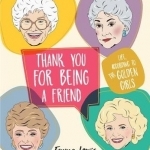
Thank You for Being a Friend: Life, According to the Golden Girls
Emma Lewis and Chantel de Sousa
Book
Everything you need to know about life, according to the fearless wisdom of The Golden Girls'...
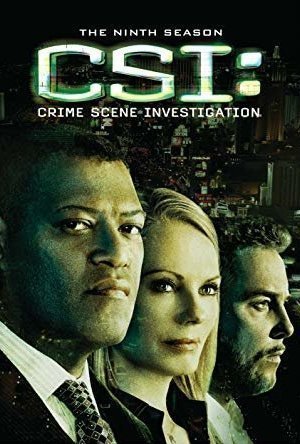
CSI: Crime Scene Investigation - Season 9
TV Season
As the team grieve for their fallen colleague ("For Warrick"), Grissom makes a life changing...
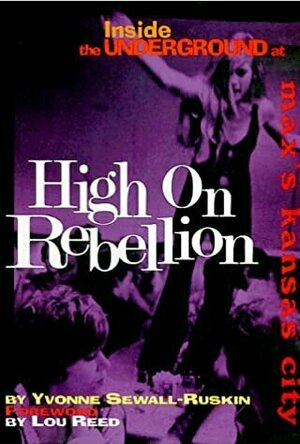
High on Rebellion: Inside the Underground at Max's Kansas City
Book
Max's Kansas City, an all-in-one restaurant-bar-nightclub, opened its doors in December 1965 at 213...
Gareth von Kallenbach (980 KP) rated Men in Black III (2012) in Movies
Aug 7, 2019
Men In Black 3 features a time travel plot, with a comedic twist, that focuses on the relationship between Agent J, and surly old character, Agent K. Will Smith and Tommy Lee Jones have fantastic and seamless chemistry that makes it easy to dispel disbelief and emerse yourself into this secret world of aliens among us.
The film starts off with what seams like a casual conversation, between wise cracking charismatic Agent J and always grumpy Agent K, but soon leads to Agent K stonewalling J’s questions about K’s past by stating, “Don’t ask questions you don’t want to know the answers to.” As Will Smith’s character persists, our curiosity grows, and a conspiracy of a cover up and clues to Agent K’s dark past unfolds.
Meanwhile, one of the most feared criminals in the galaxy, Boris the Animal (Jemaine Clement), has just escaped from a maximum security prison that was built on the moon to detain him. Boris wants nothing more than to seek revenge on the person responsible for his 40 year incarceration and kill the man responsible for the loss of his arm, Agent K. Through a murderous rage Boris secures a time travel device and jumps back in time to 1969, where he rewrites history by killing K in hopes that his Boglodite alien kind will fulfill their mission to use and destroy present day Earth. The only person aware that time has been altered is, of course, Agent J who ends up traveling back in time to stop Boris the Animal. In doing so, Agent J unites with the younger Agent K (Josh Brolin) and has to work together to ultimately save mankind. Josh Brolin’s performance was spot on. He gave an uncanny impression of Jones, right down to the mannerisms and facial expressions. He was very entertaining to watch.
When I first heard about a third Men in Black movie, I didn’t expect much out of this 10 year dormant franchise. Mainly because the second movie left so little to be desired, due to its horrible storyline and less than stellar performances by the lead characters. I honestly cannot remember a single enjoyable moment from Men in Black 2, someone must have neuralized me!
Barry Sonnenfeld is back in the director’s seat, hoping to redeem himself from the disaster that was Men in Black 2. He attempts to return to the original formula that made the first Men in Black movie fun, original and entertaining. Proving to have succeeded in creating a more worthwhile storyline, there are however moments within the movie that seem a bit thrown together, times in the plot that could have been expanded upon but may have ended up on the editing room floor.
Kudos to the special effects and art direction team for once again creating amusingly and outlandish aliens that were the real stars of the show. The special effects, such as Boris’ dart spitting spider-like creature that lives inside his hand, were particularly gruesome.
Both Sonnenfeld and Smith, who serve as producers, were aiming at providing more substance to the third installment. They wanted to delve into the relationship between J and K and why K has such a bitter and distant persona, especially after having been partners for 15 years. The real reasons will shock you. I won’t spoil the surprising end, but it was a touching twist that I did not see coming. It made me appreciate both characters and had me walking out of the theater feeling pumped up from all of the action, giddy from all of the laughs and moved from the heartfelt ending. They pulled it off without being sappy, a well rounded action comedy, suitable for the whole family.
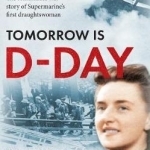
Tomorrow is D-Day: The Remarkable War Story of Supermarine's First Draughtswoman
Book
At 10.15 a.m. on Saturday 3 June 1944, a shaft of sunlight fell across my board, sending a brilliant...
Letters of Sylvia Plath
Sylvia Plath, Karen Kukil and Peter K. Steinberg
Book
The Letters of Sylvia Plath: Volume One (1940-1956). Sylvia Plath (1932-1963) was one of the writers...
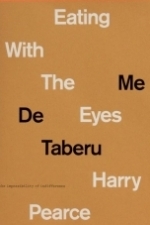
Eating With the Eyes
Book
Eating With The Eyes [Unit 23] is a visual mediation and a photographic recording of accidental...
Design photography
James Wood recommended Hallo Sausages: The Lyrics of Ian Dury in Books (curated)
5 Minute Movie Guy (379 KP) rated Focus (2015) in Movies
Jul 1, 2019
Unfortunately, therein lies the film’s biggest problem. While I do think there is some merit in its depiction of the con game, Focus for the most part is unconvincing. Not only did I feel like I was being conned by the characters, but I felt like I was being conned by the legitimacy of the cons themselves. Most of them are quite a stretch, to say the least, but more troublesome is that their successful outcomes don’t ever feel truly earned. Everything just cleans up too neatly, due to some inane level of planning that relies on far too many improbable factors and additionally treats every mistake as if it was part of the plan all along. Therefore, trying to take Focus seriously is something of a brain-numbing exercise. While the film itself is fairly entertaining, it’s not nearly as smart as it thinks it is.
As a viewer, it feels like there’s not much of a pay-off in watching them pull off their successful schemes, and that’s largely because we’re left out of the loop. We the audience are being played the whole time. We’re not given any room for our own participation and guesswork because the movie gives us no clues to help us solve the puzzle. Yet it’s inviting us to look for answers by emphasizing the importance of being focused and aware, while withholding any and all necessary clues to help us make sense of what is happening along the way.
In Focus, Will Smith plays con-man Nicky, who meets a beautiful woman named Jess (Margot Robbie) while dining alone one night. After inviting Nicky to her hotel room, Jess attempts to con him with the help of a friend, but ultimately fails. After all, you can’t hustle a hustler. Being eager to learn more, Jess wants Nicky to take her under his wing and teach her the art of his craft. What ensues is a steamy relationship and a partnership in deception.
Jess proves to be a natural in the con game, quickly earning the respect and admiration of Nicky, who allows her to join his thirty-strong crew. This team of crooks racks up millions through swindling, hustling, and pickpocketing. It’s fun to watch the action unfold, but a little disconcerting that it glorifies these criminals while they’re plainly stealing from innocent strangers. Make no mistake about it, Focus portrays them as the good guys, and offers little to no consequence for their devious actions. Still, it’s hard to root against this cast of con-artists, and you’ll want to see how they manage to get away with it all.
Instead, Focus tries to make you believe there isn’t any con in play at all, only to later pull out the rug to reveal a highly ludicrous scenario. It feels dishonest and cheap, like it’s essentially cheating its way to the desired outcome without doing the work to get there. It’s selling its own capers short and taking the fun out of them. Thus even the climax of the film feels disjointed because we can’t believe what we’re seeing and just have to watch incredulously as we wait for the inevitable far-fetched explanation.
Despite the shortcomings of the cons, I would like to express that the film still does plenty of things right. First and foremost, Will Smith shines in his performance, adding enough perplexity to his character to keep you on your toes. He makes it hard to tell whether or not his character Nicky is bluffing, which helps add to the tension of scenes. Even when Nicky appears to break character and let his guard down, I still found myself guessing about his true intentions. While the movie is overall somewhat of a letdown, I can safely say that Will Smith absolutely nails it.
The only issue I had with Will Smith is his character’s obsession with Margot Robbie’s Jess. I’m sure many guys could attest to a Margot Robbie obsession, but I’m not one of those guys. While the chemistry between Smith and Robbie was fairly good, it did seem more than a tad blown out of proportion. The romance between them felt rushed and more lustful than loving. Still, Robbie gives a respectable performance of deception and allure.
I would like to particularly applaud the work of B.D. Wong, who plays a high-stakes roller that gambles with Nicky during the Super Bowl, in what is my personal favorite scene of the movie. The tension between Wong and Smith is absolutely electrifying, and they play off of each other extraordinarily well. I was on the edge of my seat throughout their whole encounter, only to have the moment spoiled by an absurd and unlikely final outcome.
The other performances are all adequate, though most of the characters are given little screen time, aside from Nicky’s perverted, overweight associate Farhad (Adrian Martinez) who musters up a few laughs. The dialogue can be pretty hit-or-miss, and the plot is rather thin, but the production values are outstanding. This is a film that is unmistakably beautiful to look at, with gorgeous sets and superb camera work. One particularly admirable scene has the camera placed in the passenger seat focused on a man who is gearing himself up before he deliberately crashes his car head-on into another. It’s a moment that feels like a strange detour, and yet it’s so bizarre and memorable that it just works.
Focus has the makings of an excellent film, but it regrettably drops the ball by fumbling the con game. If only the cons themselves weren’t so far-fetched and sloppy, the whole movie would have been a whole lot more effective. Despite the film’s insistence that you look closely, its most pivotal moments don’t hold up to any sort of analysis or scrutiny. In other words, this is a film that would be best enjoyed out of focus.
(This review was originally posted at 5mmg.com on 1.31.16.)
